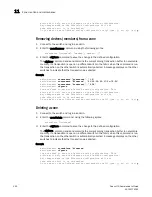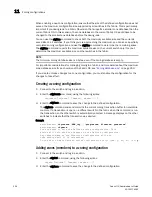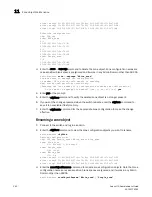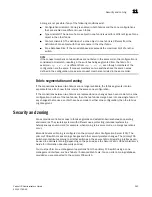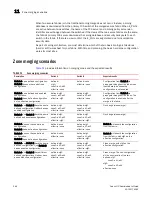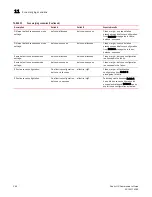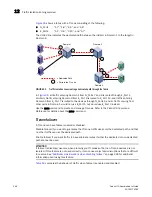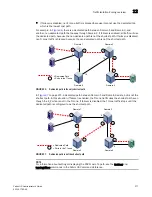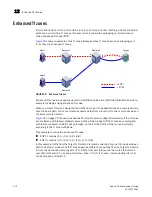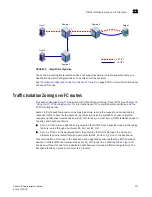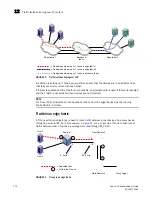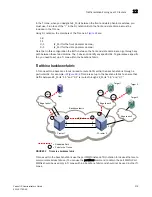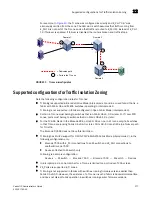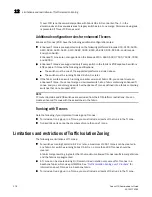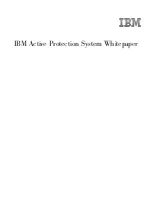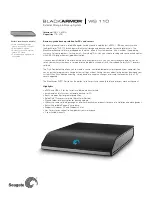
Fabric OS Administrator’s Guide
263
53-1001763-02
Security and zoning
11
A merge is not possible if any of the following conditions exist:
-
Configuration mismatch: Zoning is enabled in both fabrics and the zone configurations
that are enabled are different in each fabric.
-
Type mismatch: The name of a zone object in one fabric is used for a different type of zone
object in the other fabric.
-
Content mismatch: The definition of a zone object in one fabric is different from the
definition of zone object with the same name in the other fabric.
-
Zone Database Size: If the zone database size exceeds the maximum limit of another
switch.
NOTE
If the zoneset members on two switches are not listed in the same order, the configuration is
considered a mismatch, resulting in the switches being segmented from the fabric. For
example:
cfg1 = z1; z2
is different from
cfg1 = z2; z1
,
even though members of the
configuration are the same. If zoneset members on two switches have the same names
defined in the configuration, make sure zoneset members are listed in the same order.
Fabric segmentation and zoning
If the connections between two fabrics are no longer available, the fabric segments into two
separate fabrics. Each new fabric retains the same zone configuration.
If the connections between two fabrics are replaced and no changes have been made to the zone
configuration in either of the two fabrics, then the two fabrics merge back into one single fabric. If
any changes that cause a conflict have been made to either zone configuration, then the fabrics
might segment.
Security and zoning
Zones provide controlled access to fabric segments and establish barriers between operating
environments. They isolate systems with different uses, protecting individual systems in a
heterogeneous environment; for example, when zoning is in secure mode, no merge operations
occur.
Brocade Advanced Zoning is configured on the primary Fabric Configuration Server (FCS). The
primary FCS switch makes zoning changes and other security-related changes. The primary FCS
switch also distributes zoning to all other switches in the secure fabric. All existing interfaces can
be used to administer zoning (depending on the policies; see the
Secure Fabric OS Administrator’s
Guide
for information about security policies).
You must perform zone management operations from the primary FCS switch using a zone
management interface, such as Telnet or Advanced Web Tools. You can alter a zoning database,
provided you are connected to the primary FCS switch.
Summary of Contents for 53-1001763-02
Page 1: ...53 1001763 02 13 September 2010 Fabric OS Administrator s Guide Supporting Fabric OS v6 4 0 ...
Page 4: ...iv Fabric OS Administrator s Guide 53 1001763 02 ...
Page 24: ...xxiv Fabric OS Administrator s Guide 53 1001763 02 ...
Page 28: ...xxviii Fabric OS Administrator s Guide 53 1001763 02 ...
Page 32: ...xxxii Fabric OS Administrator s Guide 53 1001763 02 ...
Page 40: ...xl Fabric OS Administrator s Guide 53 1001763 02 ...
Page 42: ...2 Fabric OS Administrator s Guide 53 1001763 02 ...
Page 54: ...14 Fabric OS Administrator s Guide 53 1001763 02 High availability of daemon processes 1 ...
Page 74: ...34 Fabric OS Administrator s Guide 53 1001763 02 Basic connections 2 ...
Page 102: ...62 Fabric OS Administrator s Guide 53 1001763 02 Audit log configuration 3 ...
Page 214: ...174 Fabric OS Administrator s Guide 53 1001763 02 Management interface security 7 ...
Page 228: ...188 Fabric OS Administrator s Guide 53 1001763 02 Brocade configuration form 8 ...
Page 276: ...236 Fabric OS Administrator s Guide 53 1001763 02 Creating a logical fabric using XISLs 10 ...
Page 404: ...364 Fabric OS Administrator s Guide 53 1001763 02 ...
Page 440: ...400 Fabric OS Administrator s Guide 53 1001763 02 Performance data collection 17 ...
Page 480: ...440 Fabric OS Administrator s Guide 53 1001763 02 F_Port masterless trunking 19 ...
Page 494: ...454 Fabric OS Administrator s Guide 53 1001763 02 Buffer credit recovery 20 ...
Page 574: ...534 Fabric OS Administrator s Guide 53 1001763 02 Hexadecimal overview E ...


